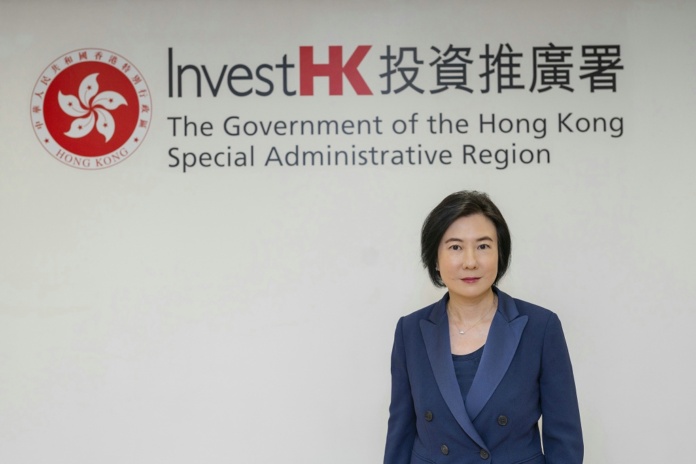By José Carlos Matias in Hong Kong
Photos by Oswald Vas
The new Director-General of InvestHK is confident in Hong Kong’s ability to remain a prime destination for FDI and talent, highlighting a post-pandemic rebound. In an exclusive interview with Macau Business, Alpha Lau casts aside worries over the SAR’s future and points to the GBA as a win-win process. She also wants to deepen ties with Macau.
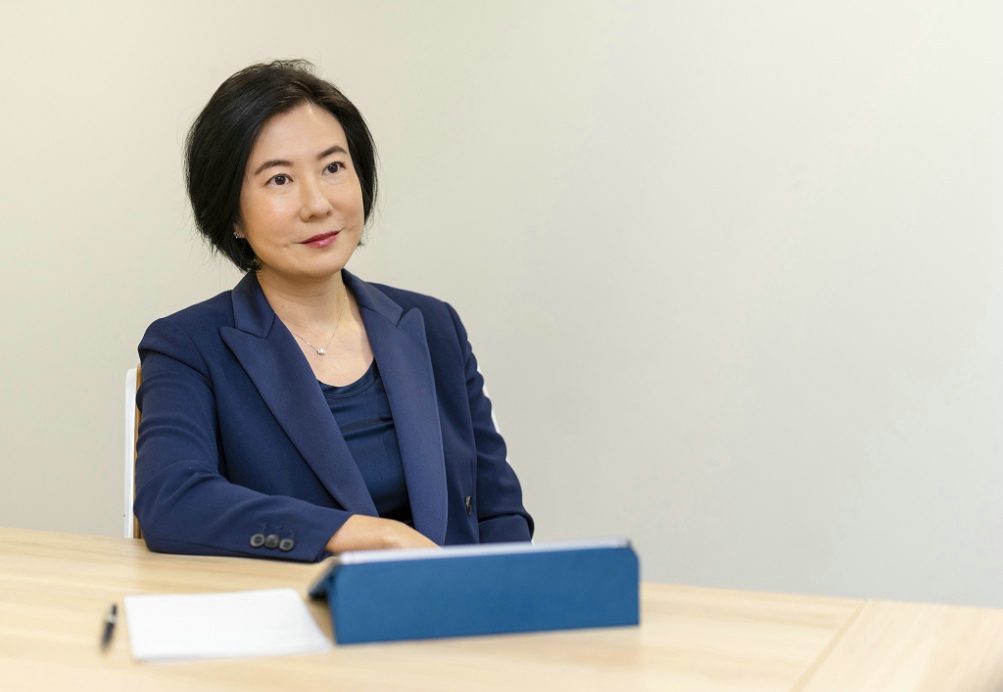
“There is a focus by the Hong Kong government in key areas: artificial intelligence, life sciences, FinTech, advanced manufacturing, and green new energy”
Four months after assuming office as Director-General of InvestHK, the neighbouring SAR’s government investment agency, Alpha Lau welcomed Macau Business into the department’s headquarters, in the heart of Hong Kong’s financial district. Her mission is to spearhead the city’s post-pandemic re-emergence as a prime FDI destination and bustling hub. Despite some less-than-hopeful overseas reports and comments, Ms. Lau underlines data and measures indicating a fresh wave of investment and professionals flocking to Hong Kong, something she anticipates will speed up quickly. The key areas are: artificial intelligence, life sciences, FinTech, advanced manufacturing, and green new energy. Macau and the Greater Bay Area also rank high on her agenda, living up to the SAR’s reputation as a springboard and bridge.
You took office as Director-General of InvestHK in November 2023. Tell us about your main mission.
Alpha Lau – Prior to joining InvestHK, I’ve been in the private sector, mainly as a banker and also in FinTech for a while. So I’ve always actually wanted to serve Hong Kong, even in my youth. Hong Kong being a financial centre, I went into banking and spent 20 years in it. I was approached by the Government in the second quarter of 2023 to talk about whether I might want to join this position to help promote Hong Kong. And I thought at that time was a very interesting opportunity because for me, it merges the two things that I really wanted to do. One is really wanted to do something for my hometown. And the other thing is that Hong Kong, I believe in itself is a product that doesn’t really need selling, but perhaps we just need to refresh the world’s knowledge of Hong Kong after the pandemic. It was not as easy when people can’t travel. So I just jumped at the opportunity when I was approached, and I was very grateful that they chose me to join this position.
“One of the key things Macau, Hong Kong, and GBA have to do is to attract more overseas companies, particularly in the fields of financial services, legal services, professional services, and IT”
You take on this role at a key juncture. Hong Kong underwent a number of challenges over the past five years, from the 2019 social unrest to the impact of COVID-19. I guess selling Hong Kong these days might be a bit more challenging than let’s say 10 years ago or 15 years ago. Is that the case?
A. L. – I do agree with you in effect, because in the past, prior to Covid, prior to the pandemic, global free trade was already a very established thing around the world. Now, since the pandemic, because of the lack of traveling, there was a dramatic effect on the business activities around the world. I believe it’s actually been quite difficult for most cities and more locations around the world to rekindle the business that’s been happening before the pandemic. So the social unrest was there, it was short, but we were happy to say that order was restored very quickly. The pandemic had a far higher-reaching consequence because of the timeframe that it took up with three years. And the lack of travel, as I mentioned, as well as certain geopolitical difficulties.
In Europe, for example, there are several conflicts going on. So when we talk to people, there’s been a lot of hesitation about going outside of your own country to do business. So, whether they say European countries or other countries around the world, before they would just come to Hong Kong, it’s just a great place to do business. But given these challenges that I mentioned, they have to, you know, re-examine their priorities, whether to expand anywhere in the world. And Hong Kong being one of the locations is certainly challenging. But I do see a lot of positive signs ahead.
“It [the GBA integration processes]is a win-win situation because in Hong Kong in addition to being a springboard we are a bridge”
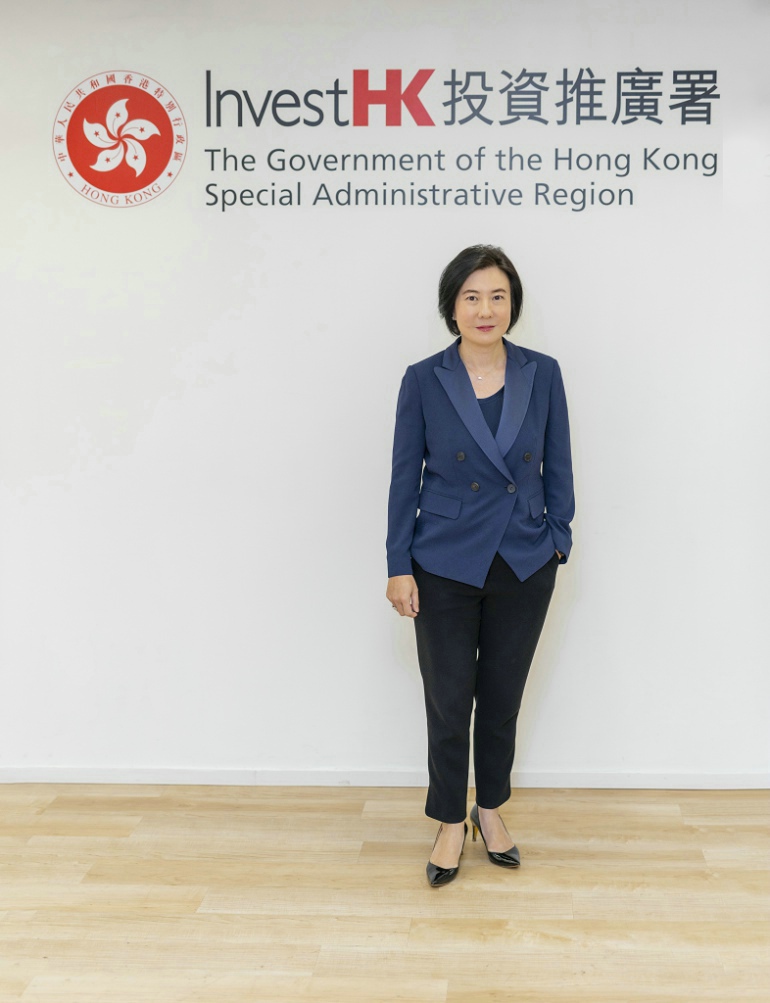
Another challenge that one can perceive regards international perception concerning the future of Hong Kong. Recently, well-known economist Stephen Roach authored an Op-Ed in the Financial Times titled “It pains to say Hong Kong is over,” a piece that generated controversy. What’s your take on this and how can perceptions be changed regarding the SAR’s future?
A. L. – Yes, there have been some comments like you mentioned in editorials. I would stress that most of them, I do not find a lot of data backing up; rather, it’s more like opinion pieces. Hong Kong is definitely an international financial centre and financial hub. Our stock market’s total capitalisation size is still one of the greatest in the world. Companies keep coming to list. We are really only just after London and New York in terms of financial activity in terms of listings. We continue to attract a lot of foreign direct investment. InvestHK ourselves for clients that we actually handhold, we brought into Hong Kong a total of 382 FDI projects last year, which brought in HKD 61.6 billion of direct investments and created 41,000 jobs. But on top of that, because Hong Kong is such an easy place and a good place to do business, there are businesses who, through their own studies or through our promotion efforts, decided just to come into Hong Kong directly, because it just takes one hour to set up a company in Hong Kong. It’s very, very easy. And there are so many professionals here, global accountants and law firms to help them out. When we look at data, the total direct investment into Hong Kong in 2022, for example, we’re still waiting for the 2023 data, was HKD 860 billion. So the numbers speak for themselves.
And the other thing is Hong Kong definitely still enjoys the One Country Two Systems policy, as our central government leaders have said time again. Hong Kong is an international centre and there’s no reason to change it whatsoever. In his recent visit to Hong Kong Xia Baolong [director of the Hong Kong and Macau Affairs Office] talked to a lot of business representatives and expatriate businesspeople based here. He reiterated that there’s absolutely no reason at all to change Hong Kong status of One Country Two Systems In fact, there will be more support for Hong Kong being one of the best international cities to do business.
When we look at the source of FDI, out of the 382 completed projects in 2023 handled by InvestHK, 35 percent were originally from mainland China, with 12.5 percent from the United Kingdom and 8.9 percent from the United States. There has been a focus on diversifying the sources of FDI. Could you elaborate on it?
A. L. – Last year, mainland China still led the way because of the proximity for Hong Kong is a jumping board for Chinese companies going outside. Number two is followed closely with the United Kingdom with 48, the US 34 and Singapore 27. This actually showcases that despite some perception or geopolitical situations other than mainland China, the main market or the main source of companies coming in are still from the UK and the US. I think that probably stems from a longer history of them investing into Hong Kong. They know already without too much promotion that Hong Kong is indeed a good place to do business. And so they are now resuming all these activities after the pandemic. Now of interest is number four, which is Singapore, in itself a financial hub. There are companies from there who really, truly want to use Hong Kong as a springboard to go into China, for example. And you can’t do that directly from Singapore. But to answer your question about promotion efforts to support the country’s Belt and Road Initiative, our Chief Executive as well as our main officials, bureau chiefs, have visited the Middle East several times, and the ASEAN countries and I shall also be doing so to further improve the communication and the understanding between our locations and to really promote Hong Kong as a gateway of going into and outside of China, because investments are actually two ways, always trade. And investments are always both ways. While we will continue to focus our efforts in Europe and US, we will increase our efforts in the Belt and Road countries.
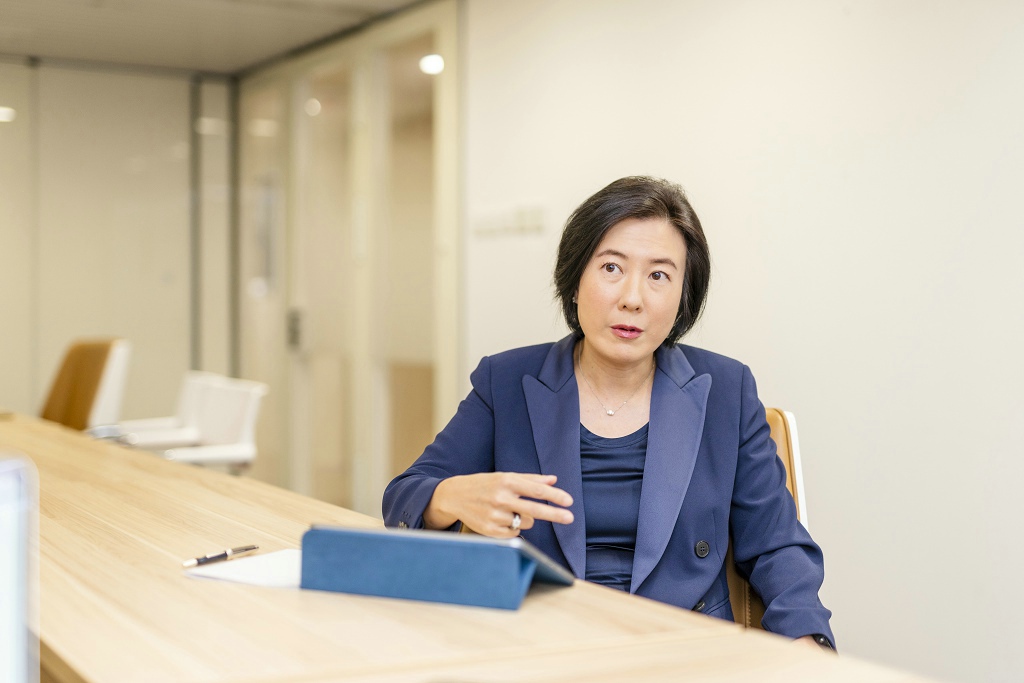
You just mentioned Singapore. A recent report by Bloomberg Intelligence argues that Singapore is stealing the limelight with regards to hosting regional headquarters of multinational firms. They mentioned 4,200 multinational firms with regional headquarters, with 1,336 found in Hong Kong. Tell us about competition coming from Singapore and elsewhere in the region and the way forward to catch up.
A. L. – Singapore and Hong Kong are very similar in several aspects. We are both common law locations. And we both have a very mature financial services sector. Although, I must say that the Hong Kong stock market is still several times their size, and it’s a destination of choice for fundraising. Now, with regards to regional headquarters, it really depends on what a company is trying to achieve or what kind of industries they’re in. I did look at the report. The data that they quoted for Hong Kong is from our own publication. We, the Census Department, which is a very trusted objective agency. Our figure in 2023 was 1,336, compared with pre-pandemic level of about 1,450. When I talk to some of these companies who have closed or exited, most of them are telling me it was because of the pandemic. They haven’t gone anywhere else. They have closed their international offices in a lot of locations because of the uncertainties brought about by the time the pandemic.
What we are doing is for this year already, and the end of last year, several companies have announced that they’re going to set up either the regional or international headquarters in Hong Kong. A few very big Chinese companies going out of China are setting up their offshore or overseas head office in Hong Kong.
So you are positive about the number of multinationals with their regional headquarters in Hong Kong getting back to pre-pandemic levels or even surpassing it soon, right?
A. L. – I strongly believe so. If not this year, then certainly at the end of next year. We are also now doubling our promotion efforts when in the past business just come to Hong Kong business, a good place to do business.
“I understand that everywhere in the world, there’s a shortage of talents and labour as a whole also because of fundamental changes in the younger generation’s work choices after the pandemic. But we are happy to say that talents are coming to Hong Kong”
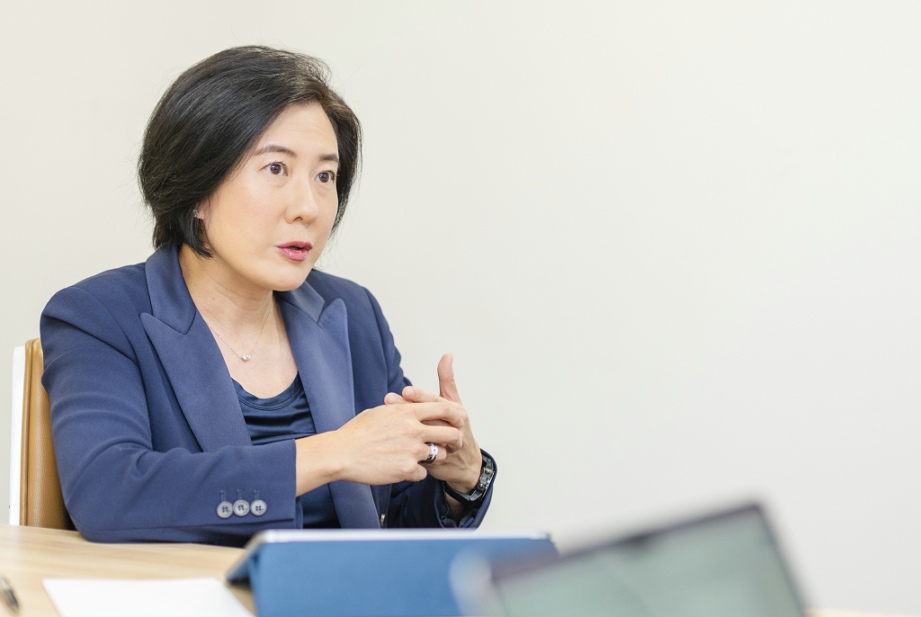
Moving from FDI sources to the profile of investments and the kind of completed projects, financial services and FinTech lead the way, but technology and innovation projects are catching up. What are your targets in this respect?
A. L. – Rather than targets, there is a focus by the Hong Kong government in four key areas of industries that we want to increase our work in: artificial intelligence, life sciences, FinTech, advanced manufacturing, and green new energy. So these are areas where we want to really focus on promotion efforts, and there are various schemes and subsidies in collaboration with the Science Park of Hong Kong, Cyberport, and also with the Innovation and Technology Bureau to double our efforts in these areas. And we’re happy to say that the growth is very quick. A lot of international research firms or companies in these areas would like to come to Hong Kong because of the strong research and development (R&D) support environment around here. And just across the border in Shenzhen is another huge talent pool with a lot of R&D industries already set up there. So the connectivity is there.
In addition to investment, human capital is pivotal. And competition for talent is fierce…
A. L. – InvestHK has 33 offices around the world, and our outreach teams are in charge of investment promotion as well as talent attraction. We work very closely with the Hong Kong Talent Engage team of the Labour Department that was formed last year. I understand that everywhere in the world, there’s a shortage of talents and labour as a whole also because of fundamental changes in the younger generation’s work choices after the pandemic. But we are happy to say that talents are coming to Hong Kong. I have been quite happy to see in recent reports that, for example, the talent attraction schemes that we have put together attracted already over 40,000 people into Hong Kong.
You have recently launched the Capital Investment Entrant Scheme. What is the rationale behind it?
A. L. – It caters to higher net worth, ultra-high net worth groups who might be interested in Hong Kong. And it’s also twofold, not only for them personally, but because these are frequently business owners who themselves have their business interests and will also be interested in Hong Kong for expanding their business as well as family investments. We have a very wide choice of investment for wealth management in Hong Kong. A lot of these families are interested in investing in start-ups, technology companies, particularly if they’re involved in say smart mobility, smart city or in green developments, green tech.
Talking about the Greater Bay Area, there are ambitious targets for regional integration. Hong Kong has been portrayed as GBA’s Super Connector. How do you foresee the interplay between Hong Kong, Macau, and the nine GBA cities in Guangdong throughout this decade? What’s next?
A. L. – We place a lot of importance on the growth of the Greater Bay working together. Hong Kong is a springboard for overseas businesses going into China, as well as Chinese businesses going outside. We are one of the core engines to drive coordinated regional economic growth. We have a prime location as an international financial shipping and trading centre. So it’s very important for mainland businesses to go global. Other than Invest Hong Kong, we work very closely with the GBA offices in Macau, relevant teams in Macau, and abroad. So within Invest Hong Kong, we have a dedicated GBA business development team. Other than the nine industry sector teams, we have a business development team since 2021 responsible for attracting international companies to expand into GBA via Hong Kong.
What kind of coordination and exchanges has InvestHK been carrying out with Macau?
A. L. – We have a Pan-GBA investment liaison group with the mainland and Macau counterparts to strengthen collaboration and synergy concerning how to promote and run large-scale promotional events which had paused during the pandemic for face-to-face events. And we also line up the Commerce Bureau of the GBA cities to conduct a meeting. So, although I’ve only joined my position for three months now, we already had a, we call a leadership kick-off meeting this year with Mr. Vincent U, the Macao Trade and Investment Promotion Institute president, as well as Mr. Zhang Jinsong, director of the Guangdong Department of Commerce. And then the three of us sat down with our teams to discuss how to take cooperation further this year. So there’ll be a series of promotion activities and we also want to kind of be able to showcase to overseas businesses coming into the Greater Bay Area of where our relative strengths are and how we could help them. I want to work even closer with Macau with businesses and government because the GBA is about the whole area. There has been a shortage of public information about this area to the rest of the world.
“I want to work even closer with Macau”
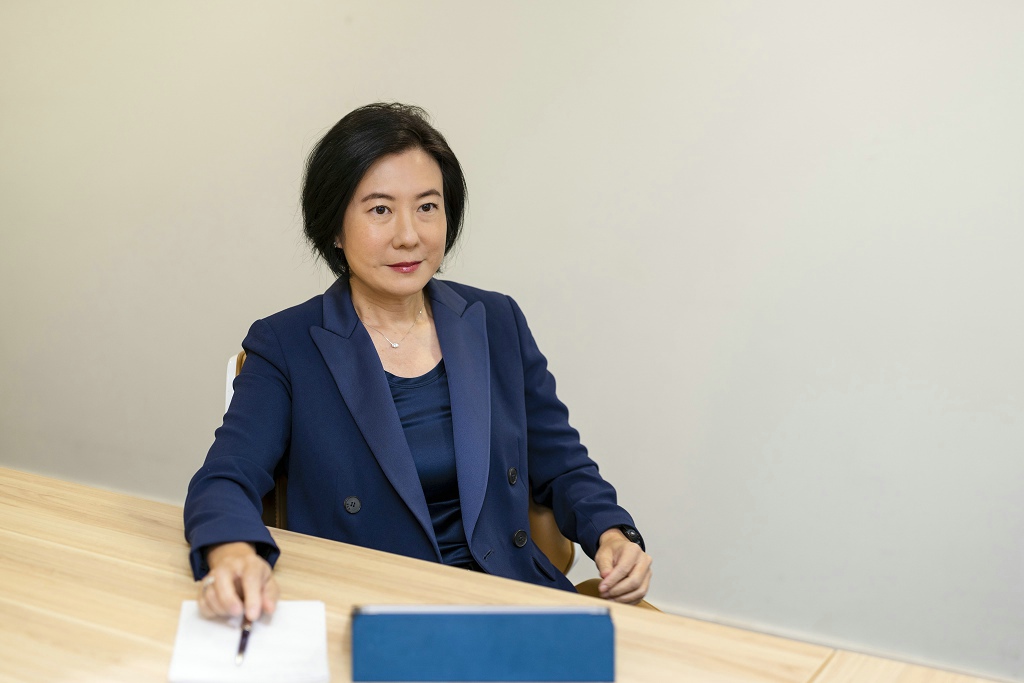
Are you also keeping an eye on Hengqin’s development?
A. L. – Yes. Hengqin has become far closer to us, through Macau since the opening of the Hong Kong Zhuhai Macau Bridge. Macau has become a very important connection for Hong Kong and into the Greater Bay Area because the connection will be increasing more and more, with more border crossings.
And just across the border here is Shenzhen’s Qianhai area…
A. L. – Yes. We work very closely with Qianhai, which is also a special zone. Recently the Constitutional and Mainland Affairs Bureau of Hong Kong led a delegation including InvestHK and various bureaus to go to Qianhai and sign an agreement to work closer together and serve companies, including Hong Kong and Macau firms and overseas companies to go into Qianhai as a jumping board to the rest of the Greater Bay Area. Some of the things that we’ve discussed with Mr. Vincent U is that together with Qianhai we have to promote new measures to international enterprises because in the end, one of the key things Macau, Hong Kong, and GBA have to do is to attract more overseas companies coming into this area, particularly in the fields of financial services, legal services, professional services, and IT.
There are some voices who are concerned that the overall GBA integration process may end up being a zero-sum game instead of win-win. How do you address this kind of scepticism?
A. L. – Well, I’m not sceptical at all. It is a win-win situation because Hong Kong in addition to being a springboard we are a bridge. Hong Kong has always been a trade flow and investment flow bridge between mainland China and the rest of the world. The investments come into Hong Kong, companies setting up here and bringing about economic benefits to Hong Kong. Because Hong Kong has a certain landmass. We are a centre of excellence for research, education, and finance. When companies come in through Hong Kong, they also need some of the manufacture and they need a lot of land and support for that, and that will be across the border. For example, a lot of them will do research and development in Hong Kong because of the strong Intellectual Property protection laws and free flow of information and talents. And then they have to do development and building. And that will be in the Greater Bay Area because there is land, support, technology, and talents in terms of manufacturing. That’s how we work closely together. It doesn’t divert investment but instead flows through Hong Kong. Some of it stays here, some of goes further through the rest of Mainland China.
Macau has been portrayed as a platform for relations with Portuguese-speaking countries. Do you see opportunities for Hong Kong concerning those markets when it comes to investment inflows and outflows, for instance, when it comes to Portugal and Brazil?
A. L. – There are a lot of very capable start-up companies in the two countries you mentioned. And they are also not only looking for funding and opportunities around the world but also, firstly, in Hong Kong because Invest Hong Kong not only works directly with companies, we also have a very close working relationship with the consuls general in Hong Kong. We have a special team looking after Chambers of Commerce. We also work very closely with the European Union Office in Hong Kong and Macau. Regarding the agenda of going green, there are a lot of European companies who want to also come into Hong Kong and the region, bearing in mind there are a lot of project opportunities in Hong Kong and the Greater Bay Area. We are doubling our efforts in this respect.





